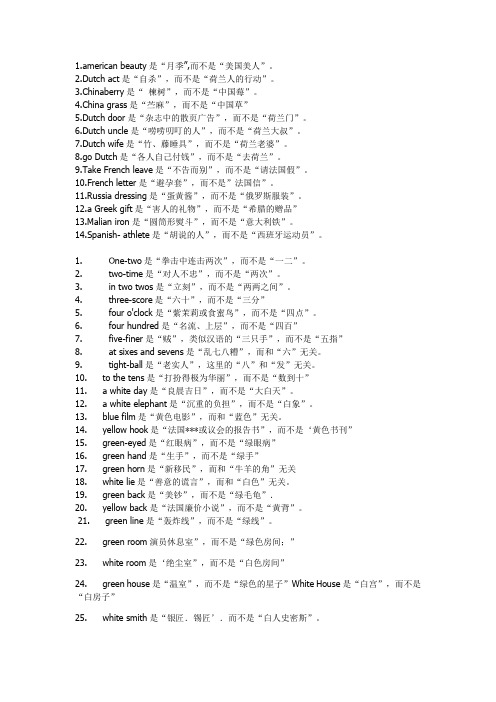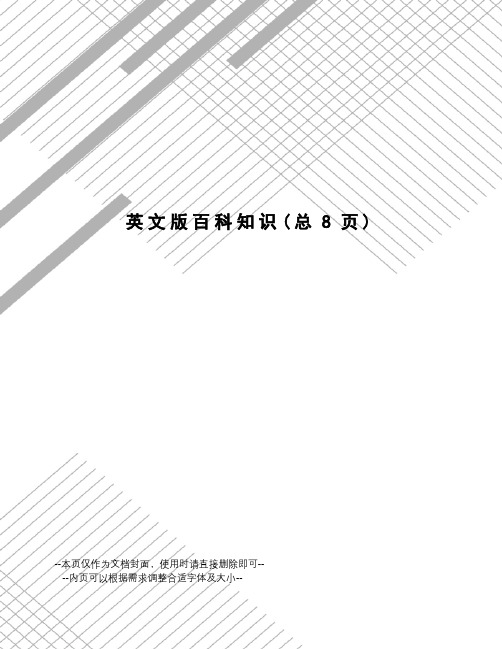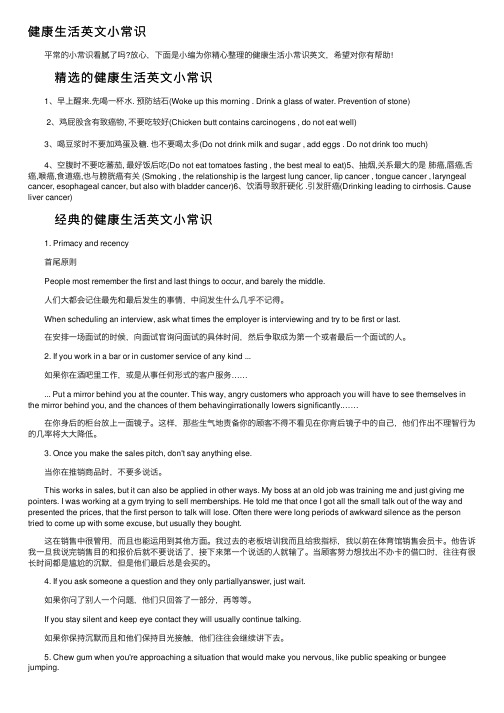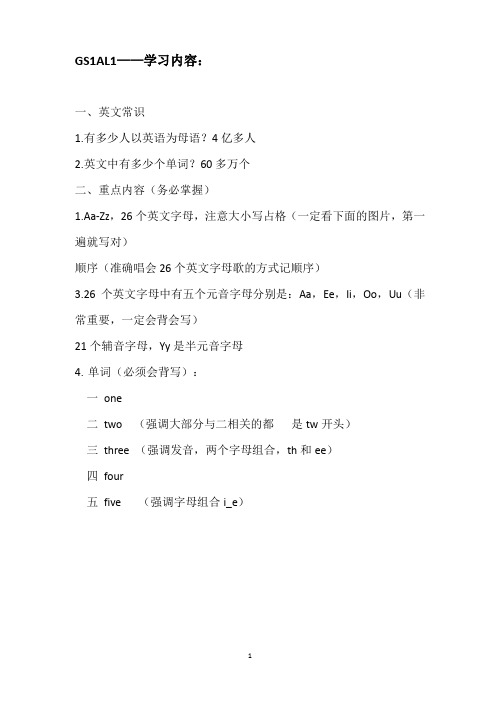英文常识
英文小常识

英文小常识一、美国常用俚语和词组American English Slang Words & Phrases1.What's up? /How are you doing? / What's new?怎么回事?你在干什么?有什么新鲜事?Eg. Hey Tom! What's up? 嗨,汤姆!最近怎么样?2.Have a crush /Attracted to someone romantically暗恋/被某人吸引Eg. I have a big crush on him. 我被他深深吸引了。
3.Screw up /To make a mistake.搞砸了/犯了错Eg. Sorry I screwed up and forgot our plans. 抱歉我搞砸了,我完全忘记我们原定的计划4.Wrap it up/To finish something. 结束、收尾、下班/去完成某件事Eg. Let's wrap it up in five minutes. 让我们在5分钟内完成它吧!二、好用的成语Useful Idioms◆Something FishyWhen someone talks about"something fishy" going on, it means there's something not quite right or they have a bad feeling about it.当有人说这里「有点鱼腥味」意思是指有些不对劲的地方或是他们有种不祥的预感For example:Susan went out with this guy and thought there was something fishy about him. She found out later he already had a girlfriend!苏珊与这男生约会的时候,总觉得有点怪怪的。
应该知道的英文知识

1.american beauty是“月季”,而不是“美国美人”。
2.Dutch act是“自杀”,而不是“荷兰人的行动”。
3.Chinaberry是“楝树”,而不是“中国莓”。
4.China grass是“苎麻”,而不是“中国草”5.Dutch door是“杂志中的散页广告”,而不是“荷兰门”。
6.Dutch uncle是“唠唠叨叮的人”,而不是“荷兰大叔”。
7.Dutch wife是“竹、藤睡具”,而不是“荷兰老婆”。
8.go Dutch是“各人自己付钱”,而不是“去荷兰”。
9.Take French leave是“不告而别”,而不是“请法国假”。
10.French letter是“避孕套”,而不是”法国信”。
11.Russia dressing是“蛋黄酱”,而不是“俄罗斯服装”。
12.a Greek gift是“害人的礼物”,而不是“希腊的赠品”13.Malian iron是“圆筒形熨斗”,而不是“意大利铁”。
14.Spanish- athlete是“胡说的人”,而不是“西班牙运动员”。
1. One-two是“拳击中连击两次”,而不是“一二”。
2. two-time是“对人不忠”,而不是“两次”。
3. in two twos是“立刻”,而不是“两两之间”。
4. three-score是“六十”,而不是“三分”5. four o'clock是“紫茉莉或食蜜鸟”,而不是“四点”。
6. four hundred是“名流、上层”,而不是“四百”7. five-finer是“贼”,类似汉语的“三只手”,而不是“五指”8. at sixes and sevens是“乱七八糟”,而和“六”无关。
9. tight-ball是“老实人”,这里的“八”和“发”无关。
10. to the tens是“打扮得极为华丽”,而不是“数到十”11. a white day是“良晨吉日”,而不是“大白天”。
12. a white elephant是“沉重的负担”,而不是“白象”。
日常常识英语大全

醋 vinegar 酱油 soy 盐 salt 加碘盐 iodized salt 糖 sugar 白糖 refined sugar 酱 soy sauce 沙拉 salad 辣椒 hot(red)pepper 胡椒 (black)pepper 花椒 wild pepper Chinese prickly ash powder 色拉油 salad oil 调料 fixing sauce seasoning 砂糖 granulated sugar 红 糖 brown sugar 冰 糖 Rock Sugar 芝 麻 Sesame 芝 麻 酱 Sesame paste 芝 麻 油 Sesame oil 咖喱粉 curry 番茄酱(汁) ketchup redeye 辣根 horseradish 葱 shallot (Spring onions) 姜 ginger 蒜 garlic 料酒 cooking wine 蚝油 oyster sauce 枸杞(枇杷, 欧查果 ) medlar 八角 aniseed 酵母粉 yeast barm Yellow pepper 黄椒 肉桂 cinnamon (在美国十分受欢迎,很多事物都有肉桂料) 黄油 butter 香草精 vanilla extract(甜点必备) 面粉 flour 洋葱 onion
肉、蔬菜类(livestock 家畜):
南瓜(倭瓜) pumpkin cushaw 甜玉米 Sweet corn 牛肉 beef 猪肉 pork 羊肉 mutton 羔 羊肉 lamb 鸡肉 chicken 生菜 莴苣 lettuce 白菜 Chinese cabbage (celery cabbage)(甘 蓝)卷心菜 cabbage 萝卜 radish 胡萝卜 carrot 韭菜 leek 木耳 agarics 豌豆 pea 马铃 薯(土豆) potato 黄瓜 cucumber 苦瓜 balsam pear 秋葵 okra 洋葱 onion 芹菜 celery 芹菜杆 celery sticks 地瓜 sweet potato 蘑菇 mushroom 橄榄 olive 菠菜 spinach 冬瓜 (Chinese)wax gourd 莲藕 lotus root 紫菜 laver 油菜 cole rape 茄子 eggplant 香菜 caraway 枇杷 loquat 青椒 green pepper 四季豆 青刀豆 garden bean 银耳 silvery fungi 腱子肉 tendon 肘子 pork joint 茴香 fennel(茴香油 fennel oil 药用) 鲤鱼 carp 咸猪肉 bacon 金针蘑 needle mushroom 扁豆 lentil 槟榔 areca 牛蒡 great burdock 水萝卜 summer radish 竹笋 bamboo shoot 艾蒿 Chinese mugwort 绿豆 mung bean 毛豆 green soy bean 瘦肉 lean meat 肥肉 speck 黄花菜 day lily (day lily bud) 豆芽菜 bean sprout 丝瓜 towel gourd (注:在美国丝瓜或用来做丝瓜茎 loofah 洗澡的,不是食用的)
英文版百科知识

英文版百科知识(总8页)--本页仅作为文档封面,使用时请直接删除即可----内页可以根据需求调整合适字体及大小--Early in the 19th century, about 60 million bison lived on the Great Plains in North America. They were central to the existence of the Plains people. Then from 1830 to 1889 they neared extinction, withless than 1,000 still roaming. Today, they are a protected animal and there are well over 200,000 living in protected areas and ranches.· I live in North America, however, I have some close relatives in Europe.· I live in plains regions. I am able to survive cold winters.· I roam out in the open on the Great Plains of North America,mostly in protected areas and private ranches.· I have a massive head, a hump over my front shou lders and sharply pointed horns.· I have a thick coat of dark brown and black hair.· I am about feet (2 meters) tall and about 9-12 feet meters) long. · I'm quite heavy. I can weigh 1800-2400 pounds (850-1100 kg).· I eat lots leaves and lots of grass.· I have help getting protection now, because I was near extinction. But I do have horns and I usually hang out in a group with my friends. · I first came to North American in prehistoric times when I crossed the Bering Strait land bridge from Eurasia.译文野牛——地图上涂绿色的地方是我的家有趣的常识:早在十九世纪,约六千万野牛生活在北美大草原上。
第一章 英文字母及其发音;常识

第一章 英文字母及其发音;常识§1.1 英语假名及其书写一览【说明】一、 五个元音字母:/a/ /e/ /i/ /o/ /u/ ;二十一个辅音:/b/ /c/ /d/ /f/ /g/ /h/ /j/ /k/ /l/ /m/ /n/ /p/ /q/ /r/ /s/ /t/ /v/ /w/ /x/ /y//z/二、 哑音字母世界上所有活的语言都处在不断地发展变化之中。
几个世纪以来,英语的语音发生了巨大的变化,一些原来在古英语中和古英语时期发音的字母(如字母b在climb ,thumb 等词后面原有发音的)现在已变得不再发音,但英语的拼写却基本保持原来的样子,这给英语单词的拼写带来了一定的困难。
时常出现单词误拼和字母漏拼现象,大部分都是由于哑音字母造成的。
1、 哑音字母/b/:(1) 字母/b/在/m/之后或/t/之前且/mb/, /bt/处于单词的末尾时,/b/往往不发音。
如: bomb 炸弹;climb 爬;comb 梳子;lamb 羊羔;limb 手足thumb 拇指;(2) /mb/, /bt/不在单词的末尾时,字母/b/仍须发音。
如:member 中的b 发音,因为mb 不在词尾。
2、 哑音字母/d/:handsome 英俊;Wednesday 星期三3、哑音字母/g/:(1)字母/g/在/m/和/n/之前构成的字母组合/gm/ /gn/在词首或词尾时,/g/原来是发音的,随着时间的推移,/g/音失去了,但原来的拼写形式仍保留了下来。
在下列单词中,字母/g/是不发音的:design设计;resign 辞职;sign符号;(2)/gm/ /gn/不在词首或词尾时,字母/g/仍须发音。
如:signature 签名4、哑音字母/gh/:日尔曼语中的/x/音在古英语中是用字母组合/gh/来表示的,随着语言的发展,摩擦音/x/消失了,/gh/ 前边的元音变长了(这就是/gh/前的元音常发长音的缘故),但/x/音的拼写符号/gh/却保留了下来。
健康生活英文小常识

健康⽣活英⽂⼩常识 平常的⼩常识看腻了吗?放⼼,下⾯是⼩编为你精⼼整理的健康⽣活⼩常识英⽂,希望对你有帮助! 精选的健康⽣活英⽂⼩常识 1、早上醒来.先喝⼀杯⽔. 预防结⽯(Woke up this morning . Drink a glass of water. Prevention of stone)2、鸡屁股含有致癌物, 不要吃较好(Chicken butt contains carcinogens , do not eat well)3、喝⾖浆时不要加鸡蛋及糖. 也不要喝太多(Do not drink milk and sugar , add eggs . Do not drink too much)4、空腹时不要吃蕃茄, 最好饭后吃(Do not eat tomatoes fasting , the best meal to eat)5、抽烟,关系最⼤的是肺癌,唇癌,⾆癌,喉癌,⾷道癌,也与膀胱癌有关 (Smoking , the relationship is the largest lung cancer, lip cancer , tongue cancer , laryngeal cancer, esophageal cancer, but also with bladder cancer)6、饮酒导致肝硬化 .引发肝癌(Drinking leading to cirrhosis. Cause liver cancer) 经典的健康⽣活英⽂⼩常识 1. Primacy and recency ⾸尾原则 People most remember the first and last things to occur, and barely the middle. ⼈们⼤都会记住最先和最后发⽣的事情,中间发⽣什么⼏乎不记得。
When scheduling an interview, ask what times the employer is interviewing and try to be first or last. 在安排⼀场⾯试的时候,向⾯试官询问⾯试的具体时间,然后争取成为第⼀个或者最后⼀个⾯试的⼈。
经济学常识(英文版)

1、What is syndicated loan ,and what are the advantages ?∙ It is a loan offered by a group of lenders (called a syndicate) who work together to provide funds for a single borrower. The borrower could be acorporation, a large project, or a sovereignty (such as a government). Theloan may involve fixed amounts, a credit line, or a combination of the two.Interest rates can be fixed for the term of the loan or floating based on abenchmark rate such as the London Interbank Offered Rate .Typically there is a lead bank or underwriter of the loan, known as the"arranger", "agent", or "lead lender". This lender may be putting up aproportionally bigger share of the loan, or perform duties like dispersing cash flows amongst the other syndicate members and administrative tasks. Alsoknown as a "syndicated bank facility"Advantage:∙Syndicated loan facilities can increase competition for your business, prompting other banks to increase their efforts to put market information in front of you in hopes of being recognized.∙Flexibility in structure and pricing. Borrowers have a variety of options in shaping their syndicated loan, including multicurrency options, riskmanagement techniques, and prepayment rights without penalty.∙Syndicated facilities bring businesses the best prices in aggregate and spare companies the time and effort of negotiating individually with each bank.∙Loan terms can be abbreviated.∙Increased feedback. Syndicate banks sometimes are willing to share perspectives on business issues with the agent that they would be reluctantto share with the borrowing business.Syndicated loans bring the borrower greater visibility in the open market.Bunn noted that "For commercial paper issuers, rating agencies view a multi-year syndicated facility as stronger support than several bilateral one-yearlines of credit."2、Introduce the Bretton Woods System and its institutions .A landmark system for monetary and exchange rate management e stablishedin 1944. The Bretton Woods Agreement was developed at the United Nations Monetary and Financial Conference held in Bretton Woods, New Hampshire, from July 1 to July 22, 1944. Even as World War II raged on, 730 delegatesfrom the 44 Allied nations attended the conference.Major outcomes of the Bretton Woods conference included the formation of the International Monetary Fund and the International Bank for Reconstruction and Development and, most importantly, the proposedintroduction of an adjustable pegged foreign exchange rate system.Currencies were pegged to gold and the IMF was given the authority tointervene when an imbalance of payments arose.3、What is the core idea of Triffin’s Dilemma ?The Triffin dilemma (or the Triffin paradox) is a theory that when a national currency also serves as an international reserve currency, therecould be conflicts of interest between short-term domestic and long-terminternational economic objectives. This dilemma was first identifiedby Belgian-American economist Robert Triffin in the 1960s, who pointed out that the country whose currency foreign nations wish to hold (the globalreserve currency) must be willing to supply the world with an extra supply of its currency to fulfil world demand for this 'reserve' currency (foreignexchange reserves) and thus cause a trade deficit.The use of a national currency (the US dollar) as global reserve currency leads to a tension between national monetary policy and global monetarypolicy. This is reflected in fundamental imbalances in the balance ofpayments, specifically the current account: some goals require an overallflow of dollars out of the United States, while others require an overall flowof dollars in to the United States. Currency inflows and outflows of equalmagnitudes cannot both happen at once.The Triffin dilemma is usually used to articulate the problems with the US dollar's role as the reserve currency under the Bretton Woods system, ormore generally of using any national currency as an international reservecurrency.4、Introduce the Venture Capital and its advantages .Venture capital (VC) is financial capital provided to early-stage, high-potential, high risk, growth startup companies. The venture capital fundmakes money by owning equity in the companies it invests in, which usuallyhave a novel technology or business model in high technology industries,such as biotechnology ,IT, software, etc. The typical venture capitalinvestment occurs after the seed funding round as growth funding round(also referred to as Series A round) in the interest of generating a returnthrough an eventual realization event, such as an IPO or trade sale of thecompany. Venture capital is a subset of private equity. Therefore, all venture capital is private equity, but not all private equity is venture capital.Venture capital is also associated with job creation (accounting for 21% of US GDP), the knowledge economy, and used as a proxy measureof innovation within an economic sector or geography. Every year, there arenearly 2 million businesses created in the USA, and only 600–800 get venture capital funding. According to the National Venture Capital Association, 11% of private sector jobs come from venture backed companies and venturebacked revenue accounts for 21% of US GDP.5、Evaluate the reasons of international financial crisis with its origin,development , and possible solution ?Main articles: Currency crisis and Sovereign defaultWhen a country that maintains a fixed exchange rate is suddenly forced to devalue its currency because of a speculative attack, this is calleda currency crisis or balance of payments crisis. When a country fails to payback its sovereign debt, this is called a sovereign default. While devaluationand default could both be voluntary decisions of the government, they areoften perceived to be the involuntary results of a change in investorsentiment that leads to a sudden stop in capital inflows or a sudden increasein capital flight.Several currencies that formed part of the European Exchange Rate Mechanism suffered crises in 1992–93 and were forced to devalue orwithdraw from the mechanism. Another round of currency crises took placein Asia in 1997–98. Many Latin American countries defaulted on their debt in the early 1980s. The 1998 Russian financial crisis resulted in a devaluation ofthe ruble and default on Russian government bonds.。
小学1-2年级英语知识点(1A2B精)

一、英文常识1.有多少人以英语为母语?4亿多人2.英文中有多少个单词?60多万个二、重点内容(务必掌握)1.Aa-Zz,26个英文字母,注意大小写占格(一定看下面的图片,第一遍就写对)顺序(准确唱会26个英文字母歌的方式记顺序)3.26个英文字母中有五个元音字母分别是:Aa,Ee,Ii,Oo,Uu(非常重要,一定会背会写)21个辅音字母,Yy是半元音字母4.单词(必须会背写):一one二two (强调大部分与二相关的都是tw开头)三three (强调发音,两个字母组合,th和ee)四four五five (强调字母组合i_e)一、单词(必须会背写)六six七seven(难背)八eight(难背,ei字母组合,gh不发音)九nine(i_e字母组合)十ten二、句子(句子书写特点:开头要大写,结尾有标点,单词与单词之间要有一个字母的距离)1. How old are you?你多大了?2. I'm five years old.我五岁了(用其他的数字做替换练习)l'm one year old.(只有一岁用的year,大于一岁我们的year就有个小尾巴s)3.Stand up.起立4.Sit down.坐下5.Raise your hand.举起你的手一、单词(必须会背写)1. pen 钢笔2. pencil 铅笔3. rubber 橡皮(字母组合er)4. ruler 格尺5. book 书(字母组合oo)6. bag 书包二、扩充单词(会读知道含义即可,不要求会背写)文具盒pencil-box pencil case笔袋pencil bag 橡皮(美式)eraser胶水glue 胶带tape文具stationery三、句子(听说读译,会重组,根据汉语会选择,不用会默写)1. Show me your pencil.给我看看你的铅笔2.Give me your ruler.给我你的格尺3.Open your book.打开你的书4.Close your book.合上你的书5.Put it down.放下一、单词1. read读(扩展单词:reader读者)2. sing唱歌(扩展单词:singer歌手)3. jump跳(扩展单词:jumper跳高运动员)4. dance跳舞(扩展单词:dancer舞者)5. write写(扩展单词:writer作家)二、句子1. What can you do?你会做什么?2.I can read.(用以上五个必背单词替换练习)我会读。
- 1、下载文档前请自行甄别文档内容的完整性,平台不提供额外的编辑、内容补充、找答案等附加服务。
- 2、"仅部分预览"的文档,不可在线预览部分如存在完整性等问题,可反馈申请退款(可完整预览的文档不适用该条件!)。
- 3、如文档侵犯您的权益,请联系客服反馈,我们会尽快为您处理(人工客服工作时间:9:00-18:30)。
sporting house 妓院(不是“体育室”)-
dead president 美钞(上印有总统头像)(并非“死了的总统”)-
lover 情人(不是“爱人”)
busboy 餐馆勤杂工(不是“公汽售票员”)
busybody 爱管闲事的人(不是“大忙人”)
dry goods (美)纺织品;(英)谷物(不是“干货”)
heartman 换心人(不是“有心人”)-
mad doctor 精神病科医生(不是“发疯的医生”)
eleventh hour 最后时刻(不是“十一点”)-
blind date (由第三者安排的)男女初次会面(并非“盲目约会”或“瞎约会”)- personal remark 人身攻击(不是“个人评论”)-
sweet water 淡水(不是“糖水”或“甜水”)-
confidence man 骗子(不是“信得过的人”)-
criminal lawyer 刑事律师(不是“犯罪的律师”)-
service station 加油站(不是“服务站”)-
rest room 厕所(不是“休息室”)-
dressing room 化妆室(不是“试衣室”或“更衣室”)-
horse sense 常识(不是“马的感觉”)-
capital idea 好主意(不是“资本主义思想”)-
familiar talk 庸俗的交谈(不是“熟悉的谈话”)
black tea 红茶(不是“黑茶”)-
black art 妖术(不是“黑色艺术”)-
black stranger 完全陌生的人(不是“陌生的黑人”)-
white coal (作动力来源用的)水(不是“白煤”)-
white man 忠实可靠的人(不是“皮肤白的人”)-
yellow book 黄皮书(法国政府报告书,以黄纸为封)(不是“黄色书籍”)- red tape 官僚习气(不是“红色带子”)-
green hand 新手(不是“绿手”)-
blue stocking 女学者、女才子(不是“蓝色长统袜”)-
China policy 对华政策(不是“中国政策”)-
Chinese dragon 麒麟(不是“中国龙”)-
American beauty 一种玫瑰,名为“美国丽人”(不是“美国美女”)-
English disease 软骨病(不是“英国病”)-
Indian summer 愉快宁静的晚年(不是“印度的夏日”)-
Greek gift 害人的礼品(不是“希腊礼物”)-
Spanish athlete 吹牛的人(不是“西班牙运动员”)-
French chalk 滑石粉(不是“法国粉笔”)-
-
-
pull one's leg 开玩笑(不是“拉后腿”)-
in one's birthday suit 赤身裸体(不是“穿着生日礼服”)-
eat one's words 收回前言(不是“食言”)-
an apple of love 西红柿(不是“爱情之果”)-
handwriting on the wall 不祥之兆(不是“大字报”)-
bring down the house 博得全场喝彩(不是“推倒房子”)-
have a fit 勃然大怒(不是“试穿”)-
make one's hair stand on end 令人毛骨悚然—恐惧(不是“令人发指——气愤”)-
be taken in 受骗,上当(不是“被接纳”)-
think a great deal of oneself 高看或看重自己(不是“为自己想得很多”)-
pull up one's socks 鼓起勇气(不是“提上袜子”)-
have the heart to do (用于否定句)忍心做……不是“有心做”或“有意做”)-
-
-What a shame! 多可惜!真遗憾!(不是“多可耻”)-
You don't say! 是吗!(不是“你别说”)-
You can say that again! 说得好!(不是“你可以再说一遍”)-
I haven't slept better. 我睡得好极了。
(不是“我从未睡过好觉”)-
You can't be too careful in your work. 你工作越仔细越好。
(不是“你工作不能太仔细”)-
It has been 4 years since I smoked. 我戒烟4年了。
(不是“我抽烟4年了”)-
All his friends did not turn up. 他的朋友没全到。
(不是“他的朋友全没到”)-
People will be long forgetting her. 人们在很长时间内会记住她的。
(不是“人们会永远忘记她”)-
He was only too pleased to let them go. 他很乐意让他们走。
(不是“他太高兴了,不愿让他们走”)-
It can't be less interesting. 它无聊极了。
(不是“它不可能没有趣”)。
